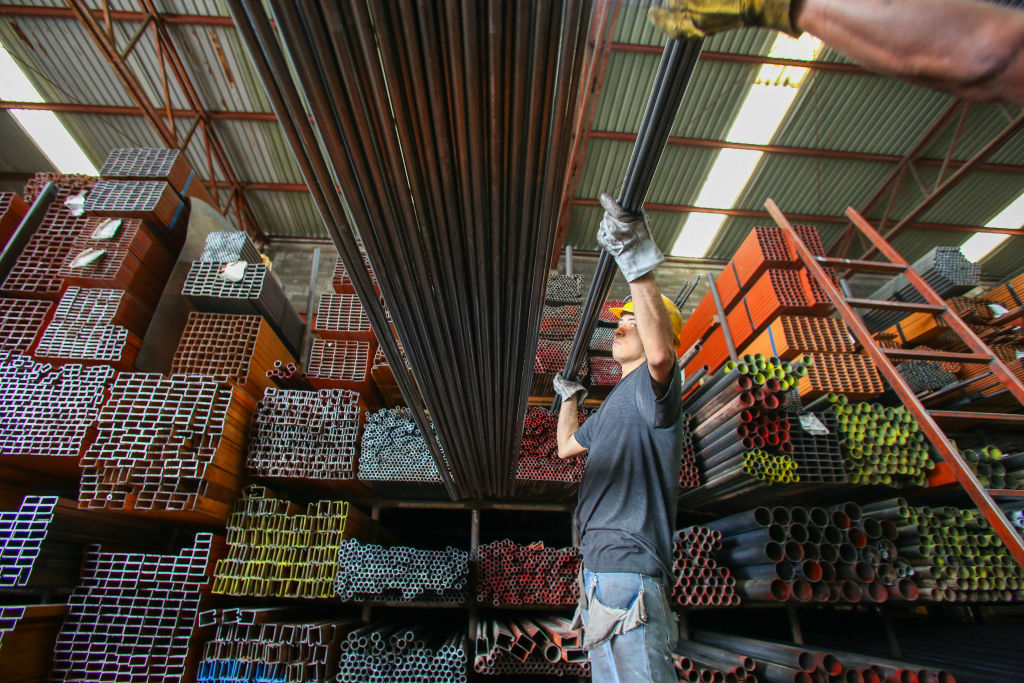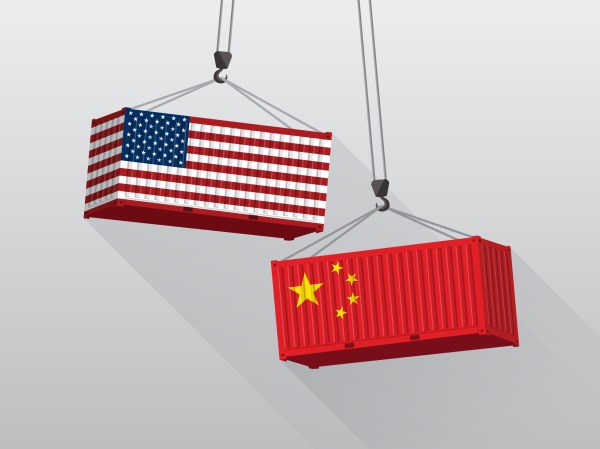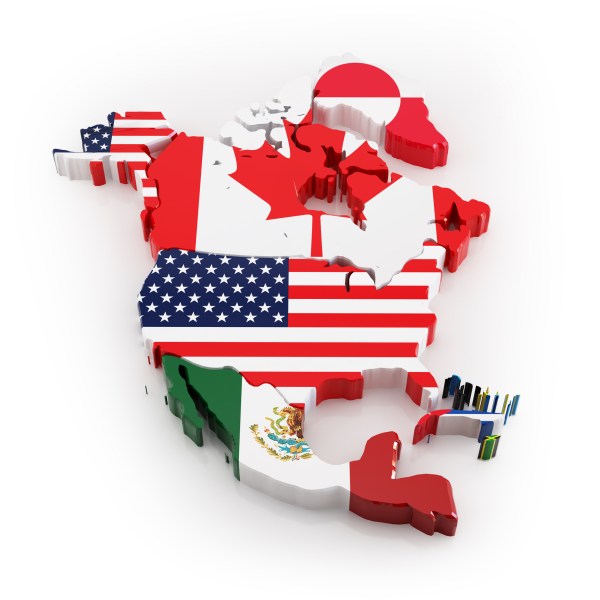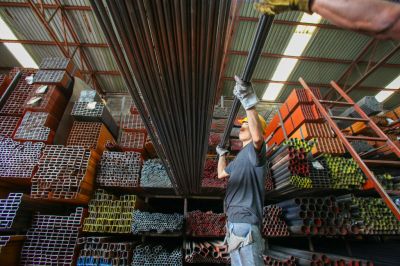Even after President Donald Trump paused implementation of fresh tariffs on most Canadian and Mexican imports, a shellshocked business community is furiously lobbying to secure exemptions from current and future trade levies.
Despite the president’s repeated campaign promises and fondness for using tariffs as a tool of economic and foreign policy, some industry executives were surprised at the speed Trump moved—on February 1, less than two weeks into his second term. Companies assumed they had until at least March to mitigate the president’s trade policies. Others were surprised Trump moved at all to slap 10 percent tariffs on most Chinese imports and announce levies of 10 percent to 25 percent on most goods and commodities from Canada and Mexico.
Trump ultimately halted, for 30 days, most tariffs on America’s two closest neighbors and largest trading partners, citing promises by Ottawa and Mexico City to better patrol their respective sides of the U.S. border for drug trafficking and illegal immigration. But the corporate scramble for carveouts—exemptions from Trump’s tariffs for products or commodities they import—has only intensified in the week since, more than a dozen Republican lobbyists told The Dispatch—even before the new steel and aluminum tariffs Trump announced Monday.
“Nobody expected the announcement on February 1; everyone thought we had more time,” a Republican lobbyist said. “Everybody’s hair is on fire over it.” Like most others The Dispatch spoke with for this story, this lobbyist requested anonymity to speak candidly, lacking authorization to disclose clients’ government-affairs activities.
On February 1, Trump cited executive powers under the International Emergency Economic Powers Act of 1977 as he unveiled plans to place “additional” tariffs of 10 percent on imports from China, and 25 percent on imports from Canada and Mexico, although a lower levy of 10 percent was attached to imported Canadian “energy resources,” per a White House fact sheet. Only the new tariffs on Chinese goods proceeded, albeit with an exception that kept in place a loophole allowing shipments worth less than $800 to be imported duty free from the Asian power. China responded by attaching retaliatory levies on American imports.
The new round of 25 percent levies on aluminum and steel, meanwhile, apply to all countries exporting the two metals—key commodities in industries like construction and automobile manufacturing—to the U.S. Tariffs impacting other imports are forthcoming, the president has told reporters.
The Republican lobbyist who described the situation as chaotic is trying to secure exemptions for a U.S.-based firm that begins the manufacturing process in its domestic plant, ships the product to its foreign facility for additional fabrication, then returns the product to the U.S. for finishing. The financial implications of Trump’s tariffs on this firm, the lobbyist said, are disastrous.
A second GOP lobbyist, a veteran advocate in Washington, D.C., closely connected to Republicans in Congress, discussed with The Dispatch recently being approached about assembling an industry coalition of firms that sell luxury consumer goods, aimed at winning exclusions from tariffs for their products.
The defense industry, meanwhile, crucial to American national security and ostensibly favored by Trump because of his promised military buildup, also is anxious for carveouts.
Many of their products are manufactured using components from up to “hundreds” of suppliers, including some based in other countries. The average artillery shell is fabricated with parts sourced from 50 domestic and foreign suppliers, one Republican lobbyist said. An average missile is produced with parts sourced from 500 such suppliers.
“Defense has a lot of worries right now,” this lobbyist told The Dispatch.
In Washington, amid high anxiety about the financial damage Trump’s tariffs could inflict on businesses’ balance sheets and consumer buying power, affected firms are nonetheless treading cautiously. The last thing a firm or industry advocacy group wants to do is go public with criticism that offends the president and undermines chances of receiving an exemption. That fear has led some firms and groups to take a wait-and-see approach, while others are attempting to register their concerns privately, whether with the Trump administration or Republicans on Capitol Hill.
Still others are airing their unease with Trump’s tariff agenda publicly, albeit carefully.
The American Petroleum Institute, representing firms in both the U.S. and Canada, mostly sees eye to eye with Trump: The president is a major supporter of fossil-fuel energy exploration and refining. But the group and Trump part company on Canadian energy imports. So, while going out of its way to avoid criticizing the president’s trade agenda, and even expressing solidarity with the larger policy, the American Petroleum Institute aims to convince the White House via friendly advocacy that doesn’t attack Trump’s trade agenda broadly but seeks to convince the president that energy is different from other imports.
In that regard the group was heartened to see Trump propose a 10 percent tariff on Canadian energy instead of the 25 percent targeted at other Canadian imports (the energy tariffs are also on hold until March 1). The differentiation tells the American Petroleum Institute that Trump may be receptive to its argument that attaching any levy to Canadian energy will hamper U.S. energy exports and the economy generally.
At issue, the American Petroleum Institute explains, is the fact that despite being the world’s largest oil producer, at approximately 13.5 million barrels daily, U.S. demand is 19 million barrels daily (American energy exports to China totaled more than $14.4 billion in 2023, the group says).
For now that gap has to be filled by imports and Canadian crude oil is plentiful, the easiest to transport to the U.S., and the most reasonably priced. Additionally, the American Petroleum Institute emphasizes, the 4 million barrels imported daily from Canada, refined primarily into fuel for transportation and agriculture, goes to refineries in the upper Midwest built specifically to process Canadian crude. Those facilities are not capable of refining either U.S. or Mexican crude oil.
“Energy markets are highly integrated, and free and fair trade across our borders is critical for delivering affordable, reliable energy to U.S. consumers,” American Petroleum Institute President and CEO Mike Sommers said in a public statement. “We will continue to work with the Trump administration on full exclusions that protect energy affordability for consumers, expand the nation’s energy advantage and support American jobs.”
Lobbyists’ primary strategy for scoring tariff exemptions involves enlisting the support of congressional Republicans in whose districts the affected firms, and their employees, reside.
That’s especially true if the House or Senate Republican in question is a close Trump ally—whom Trump might be more willing to listen to. This preferred strategy is also, partially, a result of an administration that is still staffing up crucial posts and departments that deal with trade. For example, Jamieson Greer, Trump’s nominee for U.S. trade representative, is awaiting Senate confirmation. Consequently, the office Greer oversees is not yet fully functional. Indeed, Republican Sen. Chuck Grassley of Iowa has publicly appealed to the president to exempt from the levies a Canadian agricultural import that farmers in his state rely on.
“We are definitely talking to the Hill about it and know others are as well. Folks are putting all their info together on how and where this affects member districts and states,” said a veteran Republican lobbyist in regular contact with GOP congressional leaders. “If you can get senators or House members squawking at the White House, they are better advocates.”







Please note that we at The Dispatch hold ourselves, our work, and our commenters to a higher standard than other places on the internet. We welcome comments that foster genuine debate or discussion—including comments critical of us or our work—but responses that include ad hominem attacks on fellow Dispatch members or are intended to stoke fear and anger may be moderated.
With your membership, you only have the ability to comment on The Morning Dispatch articles. Consider upgrading to join the conversation everywhere.